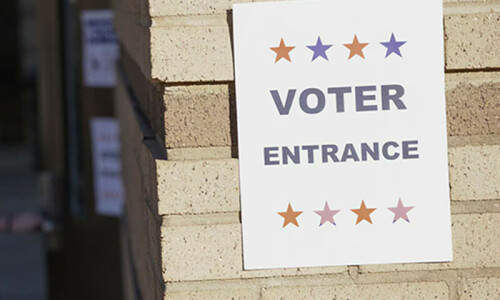ISLAMABAD, March 1: British Prime Minister Tony Blair said on Tuesday that "a moment of promise and opportunity" for Israelis and Palestinians had arrived.
In an exclusive statement e-mailed to -Dawn on Tuesday before the opening of the Middle East conference in London, Mr Blair said: "It builds on the positive momentum created by the meeting between Ariel Sharon and Mahmoud Abbas at Sharm al Sheikh on Feb 8."
Mr Blair said the conference underlines the renewed commitment of the international community to the peaceful resolution of the Palestinian problem. Mr Blair said it was an important opportunity for the Palestinian Authority to seek and secure the international support it needs to achieve its objectives.
He says the meeting would allow the Palestinian Authority to show that it is a credible partner for peace, able to make a success of Israeli disengagement and deliver on its obligations under the roadmap.
This, he says, will enable the Palestinian Authority and Israel, with international support, to implement the roadmap and put an end to the violence "which has caused so much suffering to Israelis and Palestinians". "I want to see that happen. I believe that the Israeli and Palestinian peoples do as well."
Mr Blair described the conflict between Israel and its Arab neighbours as among the most serious, damaging and longest-running political crisis the international community faces, and which undermines security and prosperity for Israelis and Palestinians alike.
"They live on edge, in fear of violence, and they suffer economic hardships. Israeli and Palestinian children do not know what it is like to go to school without feeling fear and uncertainty."
He opposed any compromise with terrorism. "I condemn in the strongest terms Friday's terror attack in Tel Aviv." This "cynical attack", to him, underlines the importance of the Palestinian Authority's efforts to establish a credible and capable security apparatus, able to respond decisively to the terrorist threat.
PRAISE FOR ABBAS: The British prime minister welcomed President Mahmoud Abbas' determination to act against terrorists and end the violence. "Our challenge is to work together to achieve a final and permanent settlement, which provides for the legitimate needs and concerns of all the peoples concerned. This requires patient negotiation and a clear view of the final destination.
"In this environment, talk of new peace initiatives can generate cynicism, a sense that everything has been tried before, and that nothing will change. I disagree that nothing can change.
There can be no excuse for doing nothing. But I do sympathize with the view that grand declarations will achieve little. Instead, we need to demonstrate solid progress on the ground."
That is why he says he is hosting a meeting in London to look at practical ways of supporting the Palestinian Authority. That is also why, he says, on Nov 12 in Washington President Bush and he set out a five- point plan. "And we are all encouraged by progress so far against that plan."
"There is now, more than ever, a real international consensus on the way forward. What is most significant is that there is a US administration ready to engage. President Bush again made it clear in Brussels last week that peace in the Middle East was at the top of his agenda - describing it as his 'greatest opportunity and immediate goal'."
A political lead from the US, according to the British prime minister, is a critical component of a re-energized peace process. "But the rest of the international community, not least the region, the Quartet, the European Union and UN, will need to make major contributions."
The meeting, he says, has been specifically convened to mobilize international support behind a plan to ensure that the Palestinians have the political, economic and security infrastructure they need to create a viable state.
"When I saw Mahmoud Abbas in December, he asked the international community to support Palestinian institution-building as a step towards independence and sovereignty. It is essential that we do so. And the time is right."
That is why, he adds, he has convened the London meeting. The meeting, Mr Blair says, will also endorse and support Prime Minister Sharon's plan to disengage from Gaza and parts of the West Bank.
'DIFFICULT DECISION': "This has been a difficult decision for Israel, but I welcome the Israeli cabinet's agreement last week to press ahead with this plan. This disengagement can only be a first step towards a final settlement that establishes a viable state of Palestine alongside a secure state of Israel. But it is a significant first step, and the Palestinian leadership knows that it needs to be prepared for it, ready and able to make it a success. Again, the London meeting will help the Palestinians prepare."
At the same time, he adds, Israel must implement its disengagement in a manner which allows the Palestinian Authority to operate successfully. "The withdrawal from Gaza must be complete.
Incursions must end, and closures must be lifted, while taking due account of Israel's own security. Gaza must be open for trade, including via a functioning port and airport." And finally, according to Mr Blair, the first four steps will lay the basis for more rapid progress on the roadmap. "The roadmap is essential. Everyone remains committed to the roadmap, which provides an agreed framework for ending violence and resuming negotiations about the most difficult issues.
But, over the last two years, progress has been hampered by a lack of trust on both sides. We have to return to a process of reciprocal actions that build trust and promote real progress."












































Dear visitor, the comments section is undergoing an overhaul and will return soon.